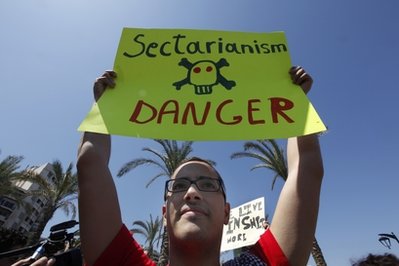by Ghassan Karam

Contrary to what many of the Lebanese political leaders often proclaim, the Lebanese political system is very highly archaic, stultified, anachronistic and even feudalistic. It is a system that is rigid and so it nurtures in its constituents a feeling of helplessness, a feeling that change is difficult if not impossible. Such feelings do not encourage free thought or free political thinking, such a system in essence is very undemocratic and helps produce a static architecture, a society whose social parameters hardly change. The individual fears self expression for the fear of being ostracized by the group in which he/she was born , a group that acts as the “modern” lord of the manor.
One easy way to understand the inefficiency implied by such a political system can be best illustrated from the study of economics. Microeconomics; price theory; is built around the concept that the most efficient society is that whose structure conforms to the strict guidelines of perfect competition. It is easy to illustrate, as every book in Econ 101, does that as markets become less perfectly competitive then the degree of exploitation and inefficiency increases. A popular such an explanation can demonstrate mathematically that a perfectly competitive market will produce quantity “a” of a good when a market that has 3 firms will produce ¾ of “a”, a market that is a duopoly (two firms) will produce 2/3 of “a” while a pure monopoly will produce only ½ of “a”.
Lebanon has adopted a system that is designed to be inefficient since it essentially has divided the country into 3 tribes. Each has its distinct identity and is not capable of thinking in terms of what is good for the national good since in its narrow vision of reality it is taught to think only of its own tribe , a narrow vision driven by selfishness. It also happens that each of these tribes is a sectarian/religious one. The main divisions are 50% of the seats in the chamber of deputies must belong to Christians while the other 50 % belong to the Moslems who are almost equally divided between Sunni and Shia. (The above does not take into consideration the 5% Druze).
As is obvious the three major sects have a fixed allotment of seats and the great majority in each sect vote in favour of their religious identity. A fixed allotment, besides being discriminatory by its nature, leads to the stagnation and the inefficiency of a market where the 3 firms agree on dividing the territory in question. This arrangement is not conducive to change, to new ideas and to progress. It does lead, inadvertently to the most conservative society, a society where the Schumpeterian and Marxist idea of political creative destruction is alien.
One easy explanation for creative destruction is the inherent competition between the firms, in any market structure, provided that the firms are not prevented from competing with each other. Boeing, the large airplane manufacturer became at one point the hegemon in the commercial aviation industry. That is when Boeing did not feel the need to innovate and to listen to the demands of its clients. It actually became so arrogant that it dictated to its clients what it thought was good for them. All of this changes and for the better, when a few European countries decided to form Airbus which introduced many a new technological breakthrough in airplane manufacturing. This obviously shook Boeing to its roots and pushed it to respond by being equally creative and equally efficient. The flying public gained from this.
This is unfortunately what passes for elections in Lebanon. No one group, except for the Christians who are more or less equally divided between the Sunnis and the Shia, feels the need to introduce new ideas and to compete on the bases of policies that are favour the common good. In that case elections are practically a sham, not because the votes are not counted accurately, but because the puppeteers are still the same ones. In a sense Lebanon has had the same puppeteers ever since its creation in 1920.
This charade must stop. Get rid of this system of specified seats and let the people vote any way that they want to but let them vote freely for whoever they want to represent them. Otherwise this silly and archaic game will always have one result and one result only: a static government and a cabinet that by having representatives from each group winds up paralyzed and cannot govern. We need to introduce the incentive of creative destruction otherwise we will continue running on the spot, as we have been doing for almost seventy years. We need to have the traditional leaders fear the outcome of elections so that they can be driven to become more open, less autocratic and more responsive. No one, not a Salam, a Hariri, a Junblatt, an Arslan, a Beri, A Gemayel, a Aoun, a Geagea…. Should feel comfortable about the outcome of the vote. It is time that we act as Lebanese Christians, Lebanese Moslems and not the reverse.

Leave a Reply
You must be logged in to post a comment.